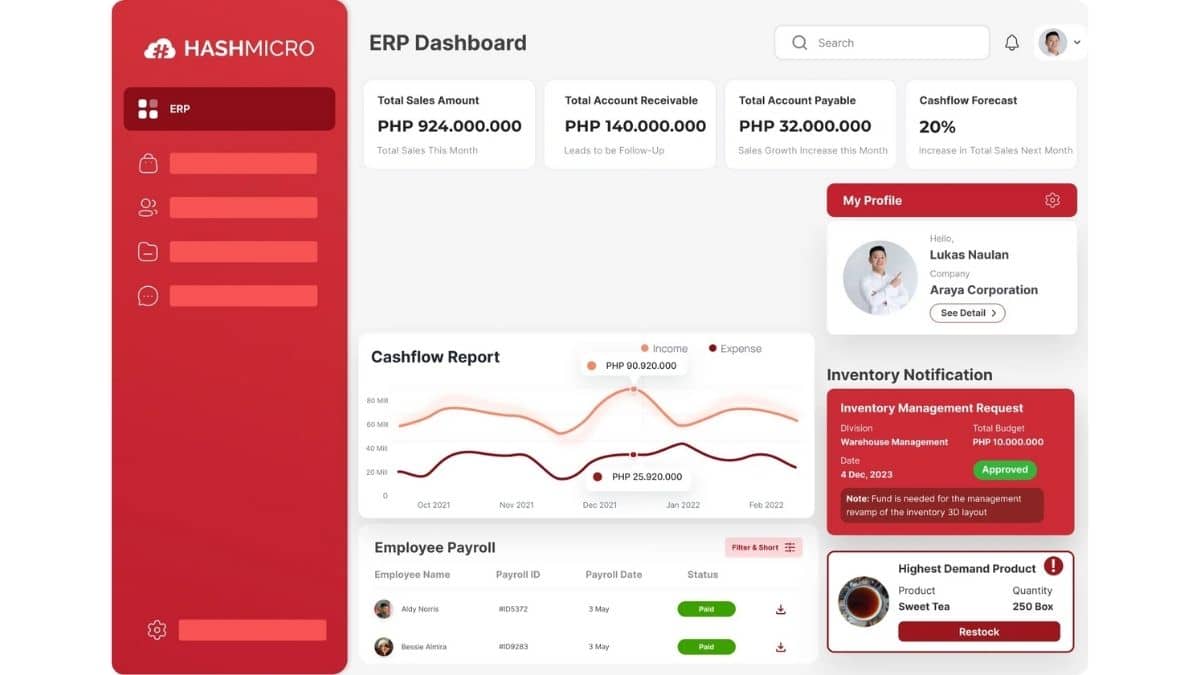Managing a supply chain management requires careful coordination to ensure seamless operations. Without an efficient system, businesses face challenges such as stock mismanagement, delayed deliveries, and increased costs. These inefficiencies not only affect day-to-day operations but also impact customer satisfaction and overall profitability.
In Malaysia, businesses are increasingly adopting digital solutions to streamline supply chain processes. A well-implemented Supply Chain Management (SCM) system helps organizations optimize inventory, enhance logistics, and improve supplier relationships. By integrating technology into supply chain operations, companies can minimize risks, reduce operational costs, and gain a competitive edge in the market.
This article will explore the fundamentals of supply chain management, its critical role in business growth, and how implementing a robust SCM system can transform your business operations.
Key Takeaways
|
Table of Content
Content Lists

What is Supply Chain Management (SCM)?
Supply Chain Management (SCM) is the process of managing the entire journey of a product, from sourcing raw materials to delivering the final product to customers. It involves coordinating logistics, suppliers, inventory, and distribution to ensure smooth operations and cost efficiency.
For Malaysian businesses, an effective SCM strategy is crucial in optimizing supply chains and reducing operational costs. Delays in procurement, poor inventory control, and mismanaged deliveries can impact revenue and customer satisfaction. By leveraging SCM technology, companies can streamline operations, gain real-time visibility, and improve overall efficiency in the competitive Malaysian market.
Why is Supply Chain Management Important?

Supply Chain Management (SCM) plays a crucial role in ensuring cost efficiency, minimizing waste, and improving overall business operations. For Malaysian businesses, effective SCM can be the difference between seamless operations and costly disruptions.
A well-optimized supply chain reduces expenses by streamlining logistics, inventory control, and procurement processes. Companies with strong SCM capabilities can lower transportation costs, minimize delays, and improve customer satisfaction. Additionally, businesses with advanced SCM systems often achieve better profitability and long-term sustainability.
Beyond financial gains, SCM also helps businesses mitigate risks. Supply chain disruptions, regulatory compliance issues, or supplier inconsistencies can be addressed proactively with real-time tracking and automated workflows. In Malaysia’s competitive market, staying ahead with an efficient SCM system ensures businesses can meet demand without unnecessary delays or losses.
Read more: Difference Between WMS and SCM
Benefits of Supply Chain Management

Implementing an effective Supply Chain Management (SCM) system provides significant advantages for businesses in Malaysia. By optimizing procurement, logistics, and inventory, businesses can streamline operations, cut costs, and enhance service quality. Below are some of the key benefits:
- Cost Efficiency: SCM reduces operational costs by optimizing logistics, minimizing waste, and streamlining the procurement process. Efficient resource allocation helps businesses save on transportation and storage expenses.
- Better Risk Management: With real-time data tracking, businesses can proactively identify and manage supply chain risks, such as supplier delays or fluctuating demand. This ensures smooth operations and reduces the chances of unexpected disruptions.
- Enhanced Customer Satisfaction: A well-managed supply chain ensures timely deliveries and consistent product availability. Meeting customer expectations strengthens brand loyalty and boosts long-term business growth.
- Data-Driven Decision Making: SCM systems provide real-time analytics that help businesses monitor inventory levels, adjust procurement strategies, and respond swiftly to market changes. This leads to more accurate forecasting and improved operational efficiency.
- Sustainability and Compliance: Modern SCM solutions help businesses adopt environmentally friendly practices by reducing waste and optimizing transportation routes. Additionally, automation ensures compliance with regulatory requirements, minimizing risks and penalties.
- Improved Inventory Management: SCM helps businesses maintain optimal stock levels by preventing overstocking or shortages. This results in better cash flow management and ensures that essential goods are always available when needed.
- Optimized Delivery and Logistics: By integrating warehouse management and transportation tracking, businesses can enhance delivery accuracy and reduce lead times. This ensures efficient distribution, improving the overall supply chain process.
With these benefits, businesses that adopt an efficient SCM system gain a competitive edge, reduce costs, and achieve operational excellence.
How Supply Chain Management Works
Supply Chain Management (SCM) involves coordinating various processes to ensure that goods move efficiently from suppliers to customers. It integrates procurement, production, logistics, and inventory management to streamline business operations.
A well-functioning SCM system connects all stakeholders, from suppliers and manufacturers to distributors and retailers. Businesses can track goods in real time, optimize supply chain costs, and improve delivery accuracy by leveraging automation and data analytics.
The process includes procurement planning, supplier evaluation, production scheduling, inventory monitoring, and order fulfillment. With advanced SCM solutions, businesses can anticipate demand fluctuations, reduce waste, and enhance customer service by ensuring timely product availability.
5 Stages of Supply Chain Management
Supply Chain Management (SCM) follows a structured process to ensure efficiency and reliability in business operations. Below are the five key stages:
- Planning: Effective SCM starts with detailed planning. Businesses assess demand, forecast inventory needs, and develop procurement strategies to align with production and distribution goals. This stage ensures optimal resource allocation and prevents supply disruptions.
- Sourcing: At this stage, businesses select suppliers and negotiate contracts. Evaluating supplier reliability, cost-effectiveness, and delivery timelines is crucial to maintaining a smooth supply chain flow. Strong supplier relationships help secure better pricing and long-term partnerships.
- Manufacturing: Once raw materials are sourced, the manufacturing process begins. This includes production scheduling, quality control, and process optimization. A well-managed manufacturing stage ensures product consistency, minimizes waste, and enhances efficiency.
- Logistics and Delivery: Timely transportation of goods is essential for customer satisfaction. This stage involves warehouse management, order fulfillment, and shipment tracking. Optimizing logistics helps reduce delays and ensures products reach customers on time.
- Returns and Customer Service: A strong SCM system includes a streamlined return process for defective or excess inventory. Efficient returns management enhances customer trust and prevents unnecessary financial losses. Businesses that handle returns effectively can strengthen their market reputation.
Each of these stages plays a vital role in creating a smooth and resilient supply chain. Businesses investing in SCM solutions gain better control over operations, minimize risks, and improve overall productivity.
Optimize Your Supply Chain with HashMicro’s SCM Software

Managing a supply chain efficiently requires the right technology to minimize errors, streamline operations, and ensure seamless coordination. HashMicro’s Supply Chain Management (SCM) software is designed to help businesses automate logistics, optimize inventory, and improve order fulfillment, providing an all-in-one solution for supply chain efficiency.
HashMicro’s SCM software offers real-time inventory tracking, automated order processing, and advanced analytics to help businesses eliminate inefficiencies, reduce costs, and enhance supply chain visibility. With its intuitive interface and flexible integration, it is tailored to support procurement, production, and distribution processes, ensuring end-to-end supply chain optimization. Key features of HashMicro’s SCM software:
- Inventory Management – Prevent stock shortages and overstocking with real-time inventory tracking and automated stock updates.
- Shipment Tracking – Monitor shipments in real-time, ensuring timely deliveries and improving customer satisfaction.
- Return Management – Simplifies product returns, enhancing customer service while maintaining accurate inventory records.
- Order Management – Automates the entire ordering process, reducing manual errors and speeding up order fulfillment.
- Procurement Management – Streamlines purchasing, supplier management, blanket order, and cost control for seamless procurement operations.
- Production Scheduling – Plans and optimizes production activities, helping businesses meet deadlines and manage resources efficiently.
- Stock Optimization – Predicts demand and optimizes stock levels to prevent excess inventory or shortages, improving cash flow.
- Planning & Forecasting – Provides data-driven insights to help businesses anticipate demand and align operations accordingly.
With seamless integration across different business functions, HashMicro’s SCM software ensures smooth coordination between departments, making supply chain processes more efficient. Its customizable and user-friendly platform allows businesses to scale and adapt as they grow, providing long-term operational benefits.
Conclusion
Supply chain management is the backbone of a business’s operational success. A well-structured SCM system ensures that goods move efficiently from suppliers to customers while optimizing costs, minimizing risks, and maintaining high service levels. Without an effective SCM strategy, businesses may face inventory shortages, delayed deliveries, and higher operational costs.
With the right supply chain management software, businesses can streamline processes, enhance visibility, and improve decision-making. HashMicro’s SCM software offers automation, real-time tracking, and seamless integration to ensure smooth supply chain operations. Investing in a comprehensive solution like this allows businesses to boost efficiency, reduce costs, and gain a competitive advantage in an increasingly dynamic market.
If your company is looking to enhance supply chain performance, now is the time to explore a robust SCM system. Start optimizing your supply chain today and stay ahead in the competitive market! Try free demo today and experience enhanced efficiency with data-driven supply chain management.

FAQ about Supply Chain Management
-
What do you mean by supply chain management?
Supply chain management (SCM) is the process of overseeing the flow of goods, services, and information from suppliers to customers. It involves procurement, production, logistics, and distribution, ensuring that products are delivered efficiently and cost-effectively.
-
What are the 5 basic steps of supply chain management?
The five key steps in SCM include planning, sourcing, manufacturing, delivering, and returns management. Planning involves forecasting demand, sourcing focuses on supplier selection, manufacturing ensures efficient production, delivery manages order fulfillment, and returns management handles defective or excess products.
-
What are the 5 main functions of supply chain management?
SCM consists of five core functions: procurement, inventory management, logistics, demand forecasting, and order fulfillment. Procurement ensures timely sourcing of materials, inventory management controls stock levels, logistics oversees transportation, demand forecasting predicts market needs, and order fulfillment ensures smooth product delivery to customers.






































